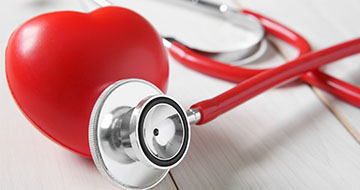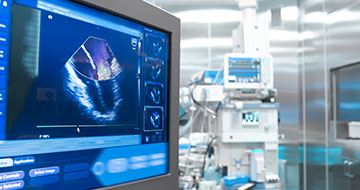Cardiology
The first step in your care process is to understand the nature of your disease so that we can diagnose your condition.
Cardiac Electrophysiology, is the study of the electrical activities of the heart, specifically for the purposes of diag...
When our patients present with problems that may be cardiovascular in nature, we help determine the most likely diagnosi...
When the heart is functioning normally, the arteries are clear and open to allow for easy passage of blood through and o...
We help our patients improve blood flow in their arteries and veins by using very small tubes and specialized tools to d...
The highly trained surgeons and specialists at Carondelet Medical Group diagnose and treat structural heart disease. We ...
{{SearchTerm}}
Seek immediate medical attention if you are experiencing this symptom.
We didn’t find an exact match for your request. Here are others to consider:
The closest doctor is {{ ClosestMiles }} miles away.
There are no results within {{ SelectedMiles }} miles of your location. Please find closest below:
Physician specialty matches Doctor Results for {{ SearchTerm }}{{ CommonSearchTermValue }}{{ BySpecialties }} near {{ ByZipCode }}
{{Title}}
{{physician.FirstName}} {{physician.LastName}}, {{physician.Title}}
{{PrintSpecialties(physician.Specialties, "Name")}}

miles
{{addressInfo(physician.Addresses, 0, "Group")}}
- {{addressInfo(physician.Addresses, 0, "Address1")}}
- {{addressInfo(physician.Addresses, 0, "Address2")}}
- {{addressInfo(physician.Addresses, 0, "City")}}{{VueFilterInfo(physician.Addresses,0,'State') ? ',' : '' }} {{addressInfo(physician.Addresses, 0, "State")}} {{addressInfo(physician.Addresses, 0, "Zip")}}
Your selected filters found no results. Please adjust your filter selection.
Please Wait Details Loading.
{{PhysicianDetails.FirstName}} {{PhysicianDetails.LastName}}, {{PhysicianDetails.Title}}
{{ PrintSpecialties(PhysicianDetails.Specialties, "Name")}}
Primary Location
{{ addressInfo(PhysicianDetails.Addresses, 0, "Group")}}
- {{addressInfo(PhysicianDetails.Addresses, 0, "Address1")}}
- {{addressInfo(PhysicianDetails.Addresses, 0, "Address2")}}
- {{addressInfo(PhysicianDetails.Addresses, 0, "City")}}{{VueFilterInfo(PhysicianDetails.Addresses,0,'State') ? ',' : '' }} {{addressInfo(PhysicianDetails.Addresses, 0, "State")}} {{addressInfo(PhysicianDetails.Addresses, 0, "Zip")}}
Languages Spoken
{{item.Name}}
Gender
{{PhysicianDetails.Gender === "M" ? "Male" : "Female"}}
About {{PhysicianDetails.FirstName}} {{PhysicianDetails.LastName}}, {{PhysicianDetails.Title}}
{{ SliceAboutMe(PhysicianDetails.AboutMe) }}
Read more about {{PhysicianDetails.FirstName}} {{PhysicianDetails.LastName}}, {{PhysicianDetails.Title}} Read less about {{PhysicianDetails.FirstName}} {{PhysicianDetails.LastName}}, {{PhysicianDetails.Title}}
- {{item.Name}}
-
{{item.Name}}
-
{{item.Name}}
The following insurance plans may be accepted by this provider. Please contact the provider's office directly to confirm insurance plans accepted.
Please contact this provider's office directly to determine insurance plans accepted.
- {{item.Payor}}
- {{item.Name}}
- {{item.Type == 'F' ? 'Fellowship' : ''}}{{item.Type == 'M' ? 'Medical School' : ''}}{{item.Type == 'I' ? 'Internship' : ''}}{{item.Type == 'R' ? 'Residency' : ''}}: {{item.Description}}
Patient Comments
Primary Location
{{addressInfo(PhysicianDetails.Addresses, 0, "Group")}}
- {{addressInfo(PhysicianDetails.Addresses, 0, "Address1")}}
- {{addressInfo(PhysicianDetails.Addresses, 0, "Address2")}}
- {{addressInfo(PhysicianDetails.Addresses, 0, "City")}}{{VueFilterInfo(PhysicianDetails.Addresses,0,'State') ? ',' : '' }} {{addressInfo(PhysicianDetails.Addresses, 0, "State")}} {{addressInfo(PhysicianDetails.Addresses, 0, "Zip")}}
Languages Spoken
{{item.Name}}
Gender
{{PhysicianDetails.Gender === "M" ? "Male" : "Female"}}
Where to Find {{PhysicianDetails.FirstName}} {{PhysicianDetails.LastName}}, {{PhysicianDetails.Title}}
#ResourceNotFound: PhysicianFinderResources, Miles2#
{{plocation.Group}}
- {{plocation.Address1}}
- {{plocation.Address2}}
- {{plocation.City}}{{plocation.State ? ',' : '' }} {{plocation.State}} {{plocation.Zip}}
Decoding Blood Pressure Numbers
Doctor’s office checkups or urgent care check-ins typically begin with a quick, painless test to measure blood pressure. A rubber cuff is wrapped around your arm and inflated, compressing an artery in your arm and momentarily stopping your blood flow. A technician uses a stethoscope to measure your blood pressure numbers when the pressure in the cuff is slowly released.
Reading the Numbers
Blood pressure numbers are a double measurement of the force of the blood against your arterial walls. The two measurements indicate how much pressure builds up in the arteries as the heart beats and then between the beats. The first, higher number is the systolic pressure, which indicates the heart’s pumping force.
The second, lower number is the diastolic pressure, which indicates the flexibility and clogging in the arteries.
What Blood Pressure Numbers Mean
The American College of Cardiology and American Heart Association revised the definition of high blood pressure to recognize the complications that can occur at lower numbers. The 2017 update changed the 2003 guidelines so that those with high blood pressure can take action to lower risk associated with heart disease.
The higher the blood pressure, the more resistance there is to blood flow. Your blood pressure will fall into one of the following categories:
- Normal/optimal
- Systolic less than 120 mm Hg and diastolic less than 80 mm Hg (120/80)
- Elevated
- Systolic is 120 to 129 and diastolic is less than 80 to 89
- High Blood Pressure Stage 1
- Systolic between 130-139 or diastolic between 80-89
- High Blood Pressure Stage 2
- Systolic at least 140 or diastolic at least 90 mm Hg
- Hypertensive crisis – requires immediate medical attention
- Systolic over 180 and/or diastolic over 120
Hypertension is a sign that the heart is working too hard to pump blood through the circulatory system because of narrow and/or inflexible arteries. Your doctor may want to measure your blood pressure over several visits before making a diagnosis.
High Blood Pressure – The Silent Killer
High blood pressure often has no signs or symptoms and is therefore called the “silent killer.” Knowing your blood pressure numbers can prepare you for making lifestyle changes to minimize risks. Your doctor may or may not recommend medication. Lifestyle changes that can make a difference include:
- Eating a low-salt, well-balanced diet
- Getting enough physical activity
- Managing stress
- Limiting alcohol
- Maintaining a healthy weight
- Not smoking
- Taking prescribed medications
How long has it been since you had your blood pressure checked? Blood pressure is a good reason to keep up with annual check-ups.










